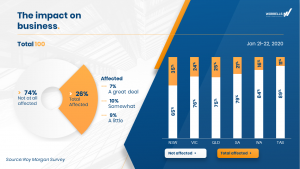Things to be aware of if you have impacted clients.
In addition to the catastrophic human, animal, and environmental costs, Australia’s recent fires have had a heavy economic toll. Estimates reported in The Guardian[1] say the cost to the economy will exceed $4.4B.
A Roy Morgan[2] survey recently asked a random selection of business owners all over Australia: “Has your business been affected by the bushfires in any way?”.
The results suggest that 26 percent of all businesses have felt at least some impact from the bushfires. And of those businesses surveyed, seven percent said it was a material impact on their business.

Considering this data, it’s evident we are talking about a sizable impact on a large number of businesses.
Here is a summary of some of the available relief and some tips on what to do if your clients have been impacted:
- Encourage clients to let people know they have been impacted. Open communication is critical.
- Check your client’s ABN address is up to date.
- Be vigilant of scammers and unscrupulous “service providers”.
- Know what grants are available that may be able to assist.
Encourage clients to let people know they have been impacted
Easily the most important thing is to encourage clients to let people know they have been affected. Particularly if they’re suffering financially or their cash reserves are being redeployed to rebuilding their lives and businesses.
Most major banks and credit unions have hardship teams dedicated to assist without needing to go through the usual hoops. The assistance measures include:
- deferring loan repayments
- waiving fees and charges
- consolidating debt
- restructuring existing loans without applying the standard fees
- deferring interest payments
- offering additional finance to help cover cash-flow shortages
- deferring upcoming credit card payments
- increasing emergency credit card limits.
The Australian Securities and Investments Commission (ASIC) and the State Revenue Office Victoria (SRO) have both announced they will consider deferral of payment and fee waivers to those impacted. The Australian Taxation Office (ATO) has several initiatives to fast track refunds and renegotiate pay as you go (PAYG) instalment arrangements. And insolvency practitioners have also been asked to exercise certain allowances/concessions with impacted clients.
The key to having the best chance of receiving some support is having open communication.
Further information: ATO website, ASIC website, SRO website: Vic SRO website: NSW
Check your client’s ABN address is up to date
Most professional advisors will have seen the ATO promoting its deferral of tax lodgements and associated payments. This applies to income tax, activity statement, self-managed super fund (SMSF), fringe benefits tax (FBT) and excise return lodgments, and their associated payments, until 28 May 2020. That deferral is automatic based on a person or business’s postcode where it’s listed as being in a fire-affected area. Check your client’s ABN address is up to date with the current and correct postcode.
For more info: Postcodes identified for deferral
Be vigilant of scammers and unscrupulous ‘service providers’.
ASIC issued a media release outlining how to avoid being scammed in the insurance claim processes (damage assessors, brokers, tradespeople) and report any experiences. See here: ASIC media release: 20-006MR.
The ATO is also warning people about a text-message scam asking people to click a link where they provide personal information in return for an eight-percent bonus on their tax return due to natural disasters. Advisors should make impacted clients aware of the need to be vigilant.
Know what grants are available and may be able to assist
Over $2 billion was allocated through government grants to assist those that were impacted—let alone what’s been raised through charitable efforts. Cash handouts are available for people whose jobs are impacted, and things like concessional loans and grants are on offer to eligible small businesses. Advisors may want to familiarise themselves with what’s available in their respective state through dedicated government websites set up to assist people and businesses within their localities e.g. the “Bushfire Recovery Victoria” website (a new permanent government agency). The types of initiatives are broad and expanding every day, and while not an exhaustive list, examples include:
- Small business bushfire recovery grants (clean-up/reinstatement of business operations).
- Concessional loans (restoring or replacing damaged business assets, working capital).
- Grants for eligible primary producers.
- Government support for tourism operators.
- Financial counselling services.
- Grants to allow for damaged fences to be repaired.
- Fence replacement/repair if land borders on national park/nature reserves.
- Disposal of partly destroyed structures.
- Stamp duty concessions for people forced to move.
- Payroll tax relief for business operating in affected areas.
- Animal welfare assessments, assistance, and exemptions on moving livestock.
- Document/licence replacement.
- Legal aid services.
Other information: South Australian business bushfire recovery, Service NSW: Bushfire customer care service, Business Queensland: bushfire relief
Undoubtedly in the short-medium term many business owners will find themselves in a situation where their business environment has changed dramatically and by necessity, they will need to reconsider their strategy going forward. In the immediate term however, there are some financial assistance and support services available.
As insolvency practitioners, our professional bodies have shared a wealth of information. If you would like further information on this topic, please contact us.
At Worrells, with 29 partners across our 34 locations, we help individuals and businesses dealing with financial stress. Your local Worrells partner is here to help.
Related articles: Six client questions to uncover business distress
[1] https://www.theguardian.com/australia-news/2020/jan/08/economic-impact-of-australias-bushfires-set-to-exceed-44bn-cost-of-black-saturday
[2] http://www.roymorgan.com/findings/8258-impact-of-bushires-january-2020-202001240501